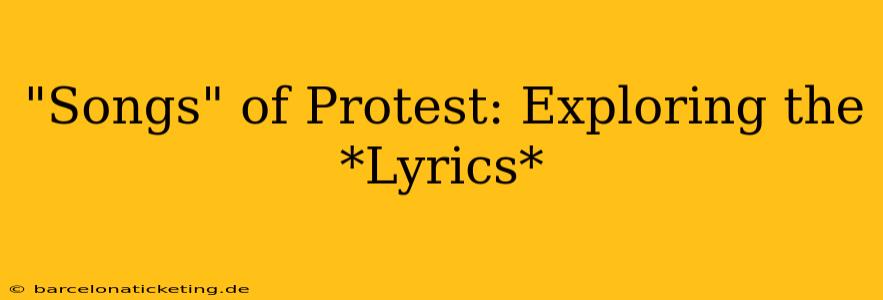Protest songs. They’re more than just music; they’re a powerful voice for the voiceless, a rallying cry for the oppressed, and a mirror reflecting the societal injustices of their time. From the soulful cries of the Civil Rights movement to the angsty anthems of punk rock, protest songs have consistently served as a potent force for social and political change. But it’s not just the melody or the rhythm; it's the lyrics that truly carry the weight of the message, weaving narratives of struggle, hope, and revolution. This exploration delves into the heart of protest song lyrics, examining their historical impact, lyrical techniques, and enduring legacy.
What Makes Protest Song Lyrics Effective?
Effective protest song lyrics aren't just about shouting slogans. They employ a range of techniques to resonate deeply with listeners:
-
Storytelling: Many powerful protest songs tell stories – personal narratives of injustice, historical accounts of oppression, or fictional scenarios that illuminate larger social issues. This relatable element helps listeners connect emotionally with the song's message.
-
Metaphor and Imagery: Vivid imagery and powerful metaphors paint pictures in the listener's mind, making the message more memorable and impactful. Think of the evocative imagery in songs like Bob Dylan's "Blowin' in the Wind," where the seemingly simple questions resonate with profound implications.
-
Repetition and Rhythm: The repetition of key phrases and the use of rhythmic patterns create a powerful and memorable effect, embedding the message in the listener's subconscious. This technique is particularly effective in creating a sense of urgency or solidarity.
-
Direct Address and Call to Action: Many protest songs directly address the listener, urging them to take action or reflect on the issues presented. This direct approach fosters a sense of personal responsibility and encourages engagement.
How Have Protest Song Lyrics Evolved Over Time?
The style and content of protest song lyrics have evolved alongside societal changes:
-
Early Protest Songs: Folk ballads and spirituals often served as early forms of protest music, subtly conveying messages of resistance and hope during times of slavery and oppression. The coded language protected the singers while delivering powerful messages to their communities.
-
The Civil Rights Movement: The Civil Rights era saw a surge in protest songs directly addressing racial inequality and calling for social justice. Artists like Bob Dylan, Joan Baez, and Sam Cooke used their music to galvanize support for the movement.
-
The Anti-War Movement: The Vietnam War fueled a new wave of protest songs, expressing opposition to the war and challenging government policies. This era saw the rise of artists like Jimi Hendrix and Creedence Clearwater Revival, who used their music to voice dissent.
-
Modern Protest Music: Contemporary protest music encompasses a diverse range of genres and approaches, from hip-hop and rap to indie rock and electronic music. Artists continue to use their music to address issues such as climate change, economic inequality, and social injustice.
What Are Some Examples of Powerful Protest Song Lyrics?
Analyzing specific lyrics reveals the power of the craft:
-
"Blowin' in the Wind" (Bob Dylan): The simple yet profound questions in this song challenge listeners to confront the complexities of war, peace, and freedom. The ambiguity of the answers forces reflection and encourages personal interpretation.
-
"Strange Fruit" (Billie Holiday): This haunting song uses vivid imagery to depict the lynching of Black Americans, serving as a powerful condemnation of racial violence. Its stark simplicity amplifies the horror of the subject matter.
-
"Ohio" (Crosby, Stills, Nash & Young): This song directly addresses the Kent State shootings, expressing outrage and grief at the loss of innocent lives. The raw emotion in the lyrics resonates with listeners even today.
What is the Impact of Protest Song Lyrics?
Protest songs have a profound and lasting impact on society:
-
Raising Awareness: They bring attention to social and political issues, educating listeners and fostering empathy.
-
Inspiring Action: They motivate people to become involved in social movements and advocate for change.
-
Preserving History: They serve as historical records of social struggles and triumphs, preserving the voices and experiences of those who fought for justice.
How Do Protest Song Lyrics Affect Social Movements?
Protest song lyrics play a crucial role in shaping social movements by:
-
Providing a Soundtrack: They become anthems that unify movements and provide a collective voice for protesters.
-
Spreading the Message: They disseminate the message of the movement to a wider audience, reaching beyond the immediate participants.
-
Inspiring Hope and Resilience: They offer hope and encouragement to those involved in long-term struggles for social justice.
Why Are Protest Song Lyrics Still Relevant Today?
The enduring relevance of protest song lyrics stems from the timeless nature of the issues they address:
-
Universal Themes: They explore universal themes of injustice, oppression, and the struggle for freedom, which remain relevant across different times and cultures.
-
Continued Relevance of Social Issues: Many of the social and political issues addressed in protest songs, such as inequality, discrimination, and war, persist today.
-
Power of Artistic Expression: Music remains a powerful medium for conveying emotion, inspiring action, and challenging the status quo.
In conclusion, the lyrics of protest songs are more than just words; they are the beating heart of social and political movements, carrying messages of hope, resilience, and the unwavering pursuit of justice. Their power lies in their ability to connect with listeners on an emotional level, inspire action, and leave a lasting legacy on the world. By understanding the techniques and historical context of protest song lyrics, we can better appreciate their profound impact and their enduring relevance in today's society.

